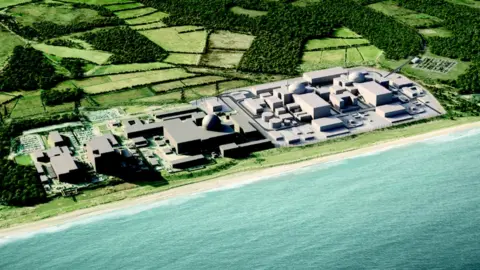Government pledges £100m for Sizewell nuclear site
 EDF
EDFThe government is putting up £100m to support the planned Sizewell C nuclear plant in Suffolk, Business and Energy Secretary Kwasi Kwarteng has announced.
The investment marks the latest stage in efforts to build the £20bn reactor on the east coast of England.
However, it does not commit the government to approving the project, which is still subject to negotiations.
Talks between the government and project developer EDF have been under way since December 2020.
The Department for Business, Energy and Industrial Strategy (BEIS) said the funding commitment would be used to continue the development of the project.
The £100m, described as an option fee, "will be invested by EDF into the project to help bring it to maturity, attract investors and advance to the next phase in negotiations", BEIS said.
"In return, the government will take certain rights over the land of the Sizewell C site and EDF's shares in the Sizewell C company, providing opportunities to continue to develop nuclear or alternative low-carbon energy infrastructure on the site, should the project not ultimately be successful."
If Sizewell C does eventually get the green light, the government will get the £100m back, plus a return on its money, either in cash or as a stake in the project.

Controversial plan
It emerged last month that the official decision on whether to build the reactor, originally expected in April, could be delayed.
The Sizewell C site could generate 3.2 gigawatts of electricity, enough to provide 7% of the UK's needs.
If work goes ahead, it is expected to take about nine years to build.
But it has proved controversial, with campaigners saying it is "ridiculously expensive" and that taxpayers will have to foot the bill for extra costs.
"In light of high global gas prices, we need to ensure Britain's future energy supply is bolstered by reliable, affordable, low-carbon power that is generated in this country," said Mr Kwarteng.
"New nuclear is not only an important part of our plans to ensure greater energy independence, but to create high-quality jobs and drive economic growth.
"The funding announced today will further support the development of Sizewell C during this important phase of negotiations as we seek to maximise investor confidence in this nationally significant project."


Sizewell C is not yet a done deal but this investment is further evidence that Sizewell C is the government's preferred site for the new nuclear power station that it has committed to approving during this parliament.
Business Secretary Kwasi Kwarteng said the government money will help advance the project and increase confidence among private investors who the government hopes to attract - in part to help it replace the 20% stake owned by Chinese company CGN.
Much of the £20bn construction cost will be funded by the addition of £1 a month to consumer bills applied through a mechanism currently making its way through parliament. Many will say this is a strange time to be considering adding money to bills expected to rise by 50% in April but the government argues that soaring gas prices make a powerful case for weaning the UK off fossil fuels.
Objectors, including Greenpeace and local action groups, say the project is too expensive, too slow and too damaging to the local environment. But ministers and trade unions argue it will provide 10,000 high skilled jobs in Suffolk and across the UK.

EDF Energy chief executive Simone Rossi welcomed the announcement.
"We're very pleased that the government is showing its confidence in Sizewell C which, if approved, will lower energy costs for consumers and help to insulate the UK from global gas prices," he said.
"Together with our own investment, these funds will allow us to continue to move the project towards a financial investment decision."
Funding model
The announcement comes as new funding rules paving the way for the Sizewell C project are making their way through Parliament, in the form of the Nuclear Energy (Financing) Bill.
The new model, known as RAB (Regulated Asset Base), has already been used to finance some large infrastructure projects, including the £4.2bn Thames Tideway "super-sewer".
It allows investors to receive returns before the projects have been completed.
The Treasury was initially reluctant to use the RAB model.
Not only does it add money to consumer bills over the lifetime of the project, but it also leaves consumers vulnerable to cost overruns, which have plagued previous nuclear developments.
However, BEIS said the RAB model would reduce the UK's reliance on overseas developers for finance.
It would do this by "substantially widening the pool of private investors to include British pension funds, insurers and other institutional investors from like-minded countries".